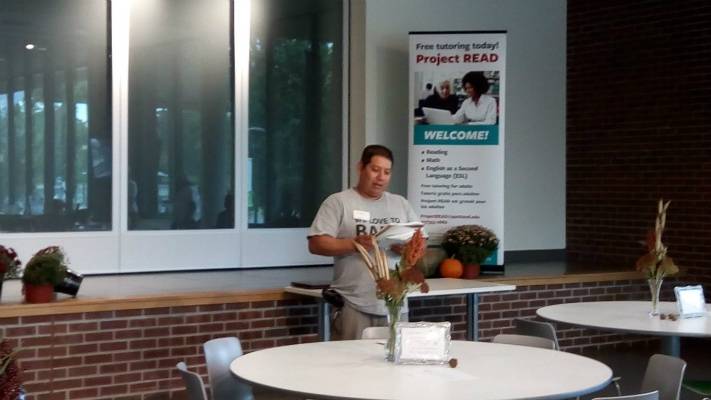Project READ began Champaign-Urbana in the 1980s as an Illinois state library grant from the Secretary of State’s office. It was reimbursed just last year and is here to stay. According to Dr. Amanda N. Harris, the Project Manager of Project READ at Parkland College, it is an adult basic education, usually referred to as ABE, which is any grade level equivalency below ninth grade in reading, writing, or math. The English proficiency level would be at an intermediate to a high-intermediate level (the highest level available). The program also allows tutoring for ESL (English as a Second Language). Having such a wide ranging program available for the public to use and benefit from really helps advance engagement in the community and leads students to better jobs.
Smile Politely: Where do you find volunteers for Project READ?
Dr. Amanda N. Harris: We have all kinds of different places that link us for volunteers, such as the libraries, CU volunteer, in addition to our own portal at Parkland Adult Ed. Basically there is a requirement from the Secretary of State’s office that all volunteers have a minimum of 12 hours of training. And internally, we like to train people for 14 hours because the idea is that this is an adult volunteer literacy grant, which means that there is an administrative staff that’s very small, however the actual services of tutors working in the community with adults is 100% volunteer delivered. In order to have quality services where the tutors feel equipped to teach someone to read, or teach someone math or English, there needs to be a little bit of a foundation in how adults learn, adult cognition, and the issues surrounding adult education, activities, lesson planning, and theory behind what they will be tutoring.
SP: Can you explain in some detail about the training process that takes place for volunteers?
Harris: The training is a combination of the online modules that the Secretary of State’s office has posted through cyberdriveillinois.com and our own face-to-face training. We have videos people can watch and we also have classroom observations, where we have people go into a classroom and watch an experienced instructor deliver content and engage students so that the volunteers get some ideas and piece together the training material that they learn online. Once they reach the minimum mark of 12-14 hours, we match them with a classroom where there is regular tutoring or with a learner who is committed to a particular time and day to work one on one.
SP: What does the tutoring process entail? Are there different situations or a universal way of helping students reach their goals?
Harris: There are three scenarios. There are adult classrooms either here at Parkland or at Urbana Adult Education. The second one is that we have these drop-in tutoring sites that are regular throughout the week at different places, including churches and libraries, the workers there have a very predictable schedule and they are always there to receive people that would like to work on their skills or certain subjects. The third scenario is where we make a match between an individual learner (or a small group) and a tutor to have a designated time schedule to work on their goals every week. We are building some other partnerships where we will be creating closed partnerships with Champaign Unit 4 Schools where we can work with parents on how to best support their kids with their homework and so on. That would be a fourth scenario but that is just a teaser!
SP: How does someone find out about Project READ?
Harris: They can come to any of the drop in sites that are publicized and the schedule is online on our own website and we also have a Facebook profile that has our schedule posted. You can call Parkland College Adult Education or simply search tutoring adults or Project READ Champaign and find us.
SP: How does a student wanting to use Project READ’s tutoring services begin using the program as a resource?
Harris: What we do when a new learner comes in and does not have a class is we give them an assessment test on an area that they want to work on and we can see what they need to work on and make decisions together on what their goals are. I want to underscore the philosophy behind the program is that it is learner centered, because the adults know what they need and they have very specific goals in mind. They might want to get their GED or fix up their math because they got a promotion and only need to work on that specific subject; the learners ultimately determine the course on what they want to work on.

SP: Are there any success stories you can provide from previous Project READ students?
Harris: Ricardo Carrillo is a Project READ “graduate” who opened his own business — Rick’s Bakery. He told his immigrant entrepreneur story at our appreciation event last weekend to help us celebrate the impact of the services that our tutors provide. Carrillo is opening his new location on Main Street in Urbana.
To learn more about the free tutoring services offered by Project READ, or to find out more about volunteering, check out their website. One of the program’s most valuable volunteers, Cathy Salika (pictured above) was just honored for her service for National Tutoring Week. You can read more about her here.
Photos provided by Project READ








